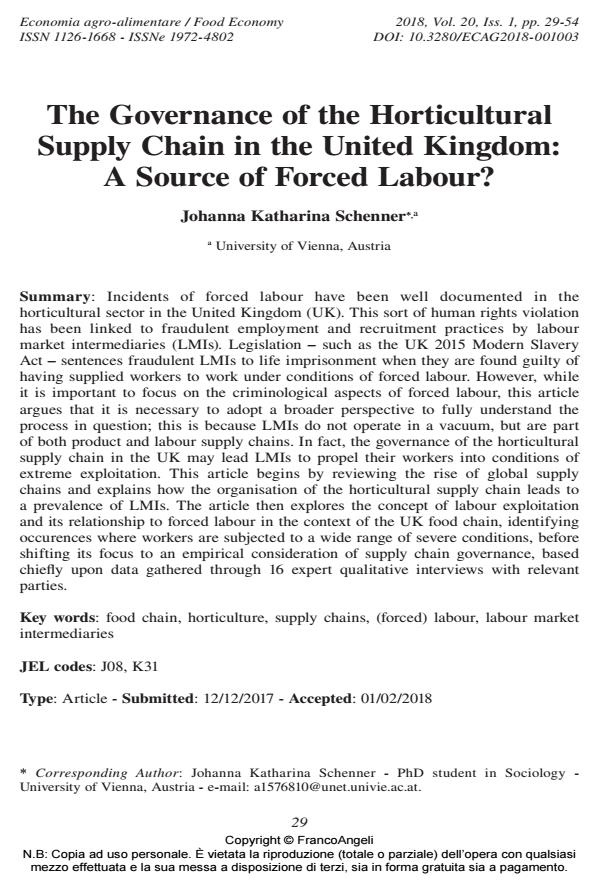The Governance of the Horticultural Supply Chain in the United Kingdom: A Source of Forced Labour?
Titolo Rivista ECONOMIA AGRO-ALIMENTARE
Autori/Curatori Johanna Katharina Schenner
Anno di pubblicazione 2018 Fascicolo 2018/1
Lingua Inglese Numero pagine 26 P. 29-54 Dimensione file 168 KB
DOI 10.3280/ECAG2018-001003
Il DOI è il codice a barre della proprietà intellettuale: per saperne di più
clicca qui
Qui sotto puoi vedere in anteprima la prima pagina di questo articolo.
Se questo articolo ti interessa, lo puoi acquistare (e scaricare in formato pdf) seguendo le facili indicazioni per acquistare il download credit. Acquista Download Credits per scaricare questo Articolo in formato PDF

FrancoAngeli è membro della Publishers International Linking Association, Inc (PILA), associazione indipendente e non profit per facilitare (attraverso i servizi tecnologici implementati da CrossRef.org) l’accesso degli studiosi ai contenuti digitali nelle pubblicazioni professionali e scientifiche.
Incidents of forced labour have been well documented in the horticultural sector in the United Kingdom (UK). This sort of human rights violation has been linked to fraudulent employment and recruitment practices by labour market intermediaries (LMIs). Legislation - such as the UK 2015 Modern Slavery Act - sentences fraudulent LMIs to life imprisonment when they are found guilty of having supplied workers to work under conditions of forced labour. However, while it is important to focus on the criminological aspects of forced labour, this article argues that it is necessary to adopt a broader perspective to fully understand the process in question; this is because LMIs do not operate in a vacuum, but are part of both product and labour supply chains. In fact, the governance of the horticultural supply chain in the UK may lead LMIs to propel their workers into conditions of extreme exploitation. This article begins by reviewing the rise of global supply chains and explains how the organisation of the horticultural supply chain leads to a prevalence of LMIs. The article then explores the concept of labour exploitation and its relationship to forced labour in the context of the UK food chain, identifying occurences where workers are subjected to a wide range of severe conditions, before shifting its focus to an empirical consideration of supply chain governance, based chiefly upon data gathered through 16 expert qualitative interviews with relevant parties.
Parole chiave:Food chain, horticulture, supply chains, (forced) labour, labour market intermediaries
Jel codes:J08, K31
- A systematic literature review of modern slavery in supply chain management: State of the art, framework development and research opportunities Vanja Strand, Maryam Lotfi, Anthony Flynn, Helen Walker, in Journal of Cleaner Production 140301/2024 pp.140301
DOI: 10.1016/j.jclepro.2023.140301 - What knowledge is required to grow food? A framework for understanding horticulture's skills ‘crisis’ Hannah Pitt, in Journal of Rural Studies /2021 pp.59
DOI: 10.1016/j.jrurstud.2021.05.001 - Empirical business research on modern slavery in supply chains: A systematic review Natalia Szablewska, Krzysztof Kubacki, in Journal of Business Research 113988/2023 pp.113988
DOI: 10.1016/j.jbusres.2023.113988
Johanna Katharina Schenner, The Governance of the Horticultural Supply Chain in the United Kingdom: A Source of Forced Labour? in "ECONOMIA AGRO-ALIMENTARE" 1/2018, pp 29-54, DOI: 10.3280/ECAG2018-001003